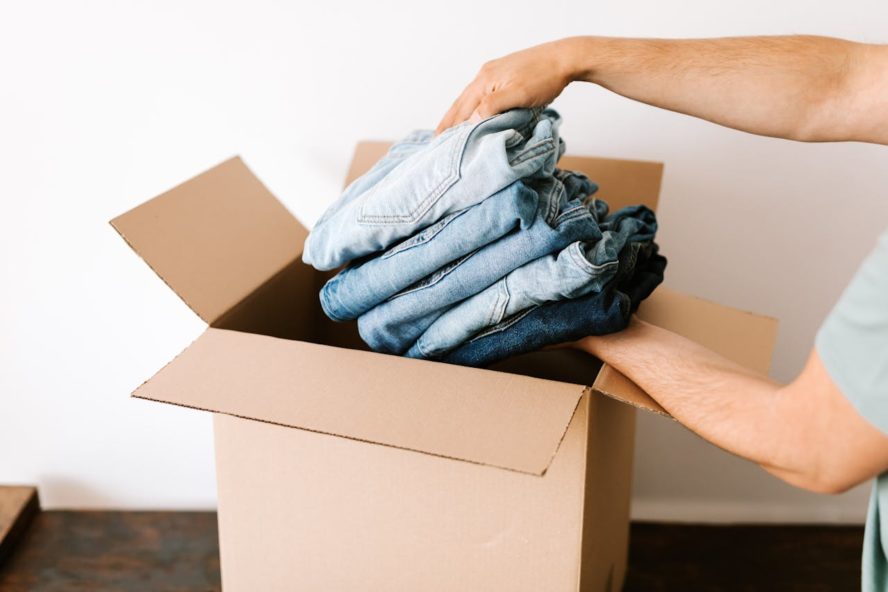Selling old clothes is a great way to make some extra cash. While you can sell directly to a consignment store or set up a stall at a flea market, one of the simplest and most profitable ways to sell clothes is to list them online. There are a myriad of different sites where you can connect with buyers. But just which platforms are worth your while? This post lists 10 popular options.
Ebay
Ebay was one of the first ever sites set up for selling used items. Since 1995, it’s remained one of the most popular platforms for selling second-hand clothes. Ebay allows you to connect to buyers all around the world who can then bid on your items. The best part about Ebay is that private accounts aren’t charged any selling fees – allowing you to maximize your profit. You will however be competing with many business accounts, which can have large collections of used clothes. This makes it hard to successfully sell clothes unless they’re rare or designer, or you’re charging a very low price.
Facebook Marketplace also doesn’t charge any fees for listings. It’s primarily a local selling site – your ads are displayed to other Facebook users in your area and you can then meet in person to make the sale. Facebook is best suited to selling cheap everyday clothes – most people here are looking for a bargain and are likely to use other sites for more specialist clothes. Because Facebook leaves the entire selling process to you, this can be one of the more labor-intensive ways of selling used clothes online.
Craigslist
Craigslist operates in a similar way to Facebook Marketplace in that it’s mainly for selling used items locally. Some people prefer this platform because your listings aren’t connected to a Facebook profile – you don’t have to be a Facebook user and customers can’t snoop on your profile. All Craigslist listings are free. As with Facebook, this platform tends to attract people looking for a bargain. You will need to arrange a place to meet with the buyer and decide on the best form of payment (typically cash).
ASOS
ASOS is better suited for those who want to sell used vintage clothes as a business. Before you can sell items through ASOS, you need to apply to become a boutique and have a business Paypal account. ASOS only accepts those selling used clothes made before the year 2000 and you need to follow strict listing rules. The site charges 20% commission on all sales (unless you are a student, in which you’re charged only 10%). The benefit of using ASOS is that it makes finding customers easier as there are so many people using this platform around the world at one time.
Poshmark
Poshmark is an Ebay-style platform that is concentrated on clothes. It offers a simpler and more streamlined listing and selling process that makes it very popular among sellers – Poshmark takes the money from customers and transfers it to you (this can be via Instant Transfer, PayPal, Venmo or direct deposit), while also providing you with free postage labels to use with UPS. You will be charged a 20% commission fee when selling through Poshmark, which is something to be wary of. There are many different tools you can use to maximize sales on Poshmark such as listing analysers and automated sharers.
Vinted
Vinted is another Ebay-style platform for all kinds of used items. As the name suggests, it is popular for vintage clothes, however you can also sell more modern used clothes through this platform. It is more focused towards private sellers than businesses and has a very simple and straightforward listing process. A major benefit of Vinted is that sellers do not have to pay any fees. Instead, buyers help pay for the platform by paying a buyer protection fee every time they make a purchase (which is usually 3% to 8% of the item’s price).
Depop
Depop also takes the Ebay model and simplifies it with a straightforward listing process. This site is very popular among Gen Z buyers and sellers and is the place to go for modern trendy second-hand clothes. To sell on Depop, you must connect your social media accounts and Paypal account. A 10% commission fee is charged on all sales (so, less than Poshmark, but more than Vinted).
Thredup
Thredup takes a unique approach to selling clothes. You pay $10 for a Clean Out Kit, which is essentially a bag that you can fill up with used clothes. Free pick-up of the bag is included in the price. The site then creates listings for all the clothing items provided. Every time an item is sold, you get an 80% cut. This essentially takes the time and effort out of selling lots of individual clothes. You may however not make as much money as were you to sell each item individually on another platform (you may even make a loss if your items don’t sell or are all sold collectively for less than $10).
Flyp
Flyp is similar to Thredup in that you fill up a box with your used clothes and then send it away to be listed and sold on your behalf. The difference is that while Thredup is centrally controlled and charged a flat commission rate, Flyp connects you to sellers who bid for your box of clothes. This allows you to potentially get a better price and commission rate for your stuff. It does however require a little more work on your part and there’s no guarantee a pro seller will buy your box.
TheRealReal
TheRealReal is an online consignment store focused on luxury designer brands. You arrange to have your clothing picked up, at which point it is authenticated by a member of TheRealReal team. They then list the item and when it sells you receive 75% commission. A lot of sellers use TheRealReal because it makes the process of selling designer clothes easy. That said, it may be possible to fetch a better price using another platform like Ebay.
- Good High School Letter Patches- 8 Key Characteristics - August 29, 2024
- Fashion Recruitment: Cultivating Talent in a Creative Industry - August 13, 2024
- Exploring the Intersection of Costume Design and Fashion at Parsons Q&A with Deborah Cantor - August 5, 2024
- 7 Steps To Creating Your Perfect Marketing Campaign - July 12, 2024
- What Are the Best Hair Vitamins for Women Over 50? - July 12, 2024


